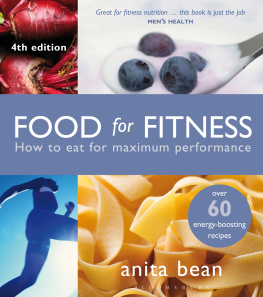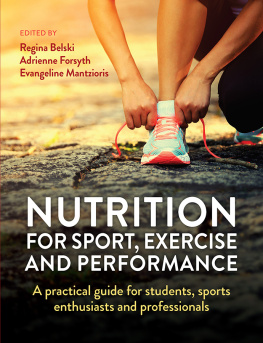Nutrition Guide For Sport Players
Why Sport Players Need A Particular Nutrition Guide And Suitable Guide For Each Sport
Copyright 2020
All rights reserved.
DEDICATION
The author and publisher have provided this e-book to you for your personal use only. You may not make this e-book publicly available in any way. Copyright infringement is against the law. If you believe the copy of this e-book you are reading infringes on the author's copyright, please notify the publisher at: https://us.macmillan.com/piracy
Contents
The Importance of Good Nutrition
SOCCER NUTRITION
BASKETBALL NUTRITION
Bodybuilding Meal Plan
Introduction To Nutrition

The essential nutrients for life include carbohydrates, proteins, and lipids (fats), as well as fiber, vitamins, minerals, and waterthe solvent for all soluble ingredients in the blood and cells. The absorption of nutrients starts the moment we begin to digest our foods, as they are transported to assist all the metabolic processes in the human body.
Good nutrition means getting the right amount of nutrients from healthy foods in the right combinations. Having nutrition knowledge and making smart choices about the foods you eat can and will help you achieve optimum health over your lifetime, and be a key to avoiding obesity, illness, and many of todays most prevalent chronic diseases.
Nutrition is just one key to developing and maintaining good health. Good health is defined as a state of complete physical, mental and social well-being a healthy mind, body, and spirit.
Nutrition is at work during our entire life-cycle from infancy to adolescence, adulthood and in our senior years and can be the antidote for many of todays common problems, such as stress, pollution, sexual vitality, and disease prevention.
For me personally, nutrition translates into health, and health is freedom. Being healthy not only makes us feel great, it enables us to enjoy life to our fullest potential, and to follow our dreams. Conversely, a poor diet can have a serious impact on health, and rob you of your freedom.
Food therapy is emerging as the latest prevention against multiple lifestyle diseases. Experts now believe its better to pop an apple, rather than popping a pill. Negative influences such as stress, shock, injury, emotional upsets and worries can have a direct impact on life-long health. The good news is that the body can heal itself, if given what it needs to do its job. The nutrition in certain foods can naturally increase your bodys oxygen levels, eliminate many sources of toxins, improve your digestion, and prevent, heal, or reduce the severity of various diseases. Nutrition is about choices.
Healthy eating is the best recipe for an abundant life. Make every bite count.
Nutrition is a critical part of health and development. Better nutrition is related to improved infant, child and maternal health, stronger immune systems, safer pregnancy and childbirth, lower risk of non-communicable diseases (such as diabetes and cardiovascular disease), and longevity.
Healthy children learn better. People with adequate nutrition are more productive and can create opportunities to gradually break the cycles of poverty and hunger.
Malnutrition, in every form, presents significant threats to human health. Today the world faces a double burden of malnutrition that includes both undernutrition and overweight, especially in low- and middle-income countries.
WHO is providing scientific advice and decision-making tools that can help countries take action to address all forms of malnutrition to support health and wellbeing for all, at all ages.
This fact file explores the risks posed by all forms of malnutrition, starting from the earliest stages of development, and the responses that the health system can give directly and through its influence on other sectors, particularly the food system.

What does nutrition matter?
Nutrition is the study of nutrients in food, how the body uses them, and the relationship between diet, health, and disease.
Nutritionists use ideas from molecular biology, biochemistry, and genetics to understand how nutrients affect the human body.
Nutrition also focuses on how people can use dietary choices to reduce the risk of disease, what happens if a person has too much or too little of a nutrient, and how allergies work.
Nutrients provide nourishment. Proteins, carbohydrates , fat, vitamins , minerals, fiber, and water are all nutrients. If people do not have the right balance of nutrients in their diet, their risk of developing certain health conditions increases.
This article will explain the different nutrients a person needs and why. It will also look at the role of the dietitian and the nutritionist.
Macronutrients

Macronutrients are nutrients that people need in relatively large quantities.
Carbohydrates
Sugar, starch, and fiber are types of carbohydrates.
Sugars are simple carbs. The body quickly breaks down and absorbs sugars and processed starch. They can provide rapid energy, but they do not leave a person feeling full. They can also cause a spike in blood sugar levels. Frequent sugar spikes increase the risk of type 2 diabetes and its complications.
Fiber is also a carbohydrate. The body breaks down some types of fiber and uses them for energ; others are metabolized by gut bacteria, while other types pass through the body.
Fiber and unprocessed starch are complex carbs. It takes the body some time to break down and absorb complex carbs. After eating fiber, a person will feel full for longer. Fiber may also reduce the risk of diabetes , cardiovascular disease, and colorectal cancer . Complex carbs are a more healthful choice than sugars and refined carbs.
Proteins
Proteins consist of amino acids, which are organic compounds that occur naturally.
There are 20 amino acids . Some of these are essential , which means people need to obtain them from food. The body can make the others.
Some foods provide complete protein, which means they contain all the essential amino acids the body needs. Other foods contain various combinations of amino acids.
Most plant-based foods do not contain complete protein, so a person who follows a vegan diet needs to eat a range of foods throughout the day that provides the essential amino acids.
Fats
Fats are essential for:
- lubricating joints
- helping organs produce hormones
- enabling the body to absorb certain vitamins
- reducing inflammation
- preserving brain health
Too much fat can lead to obesity , high cholesterol , liver disease, and other health problems.
However, the type of fat a person eats makes a difference. Unsaturated fats, such as olive oil, are more healthful than saturated fats, which tend to come from animals.
Water
The adult human body is up to 60% water, and it needs water for many processes. Water contains no calories , and it does not provide energy.
Many people recommend consuming 2 liters, or 8 glasses, of water a day, but it can also come from dietary sources, such as fruit and vegetables. Adequate hydration will result in pale yellow urine.
Requirements will also depend on an individuals body size and age, environmental factors, activity levels, health status, and so on.
Next page











